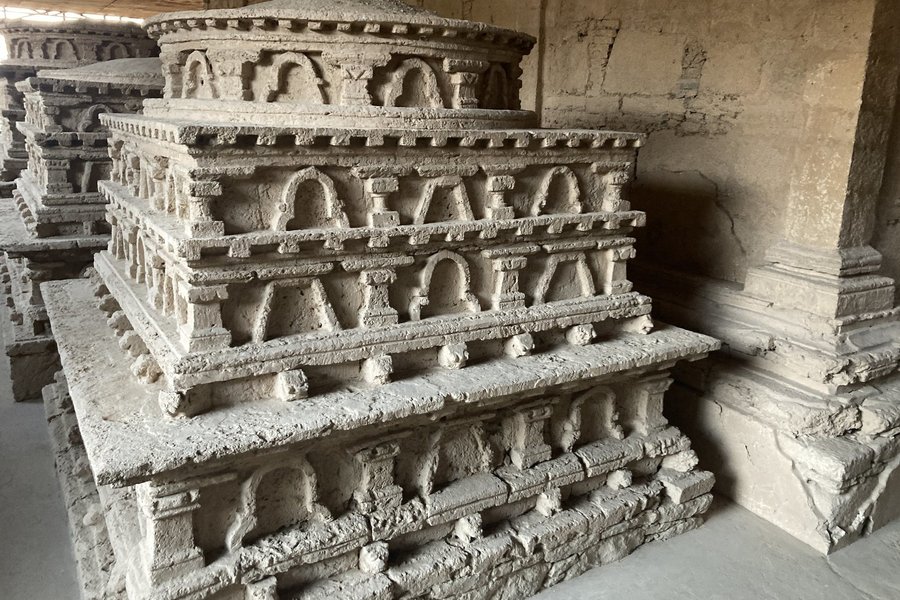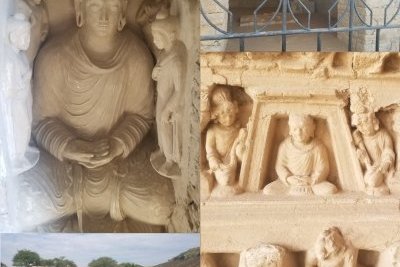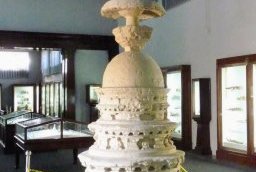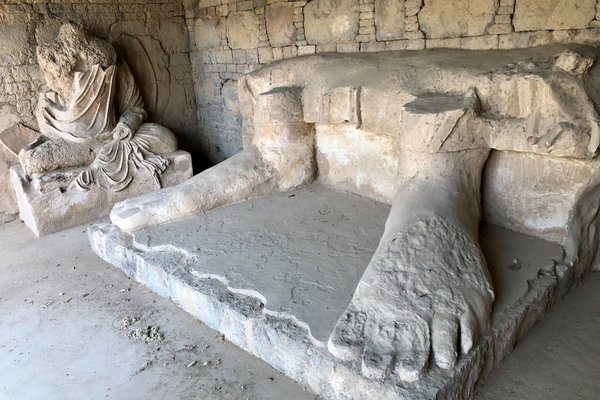Pakistan
Taxila
Taxila is an archaeological site containing the ruins of four early settlements, Buddhist monasteries and a Muslim mosque.
The Gandhâran city of Takshashila was an important Vedic/Hindu and Buddhist centre of learning and pilgrimage site from the 6th century BCE to the 5th century CE. It was located on a branch of the Silk Road and was reached by Alexander the Great. The subsequent settlements of Saraikala, Bhir, Sirkap, and Sirsukh show the urban evolution of the Indian subcontinent over more than five centuries.
Community Perspective: this is one of those sites with “a bit of everything”, spread across 18 locations. Zoë considered Jaulian monastery a must-see, and Solivagant visited Sirkap city ruins and the Jaulian and Dhamarajika monasteries. It is recommended that you go to the Taxila Museum first. A good visit to a couple of the components easily takes 5 hours. Be aware that if you visit without a guide, you may experience quite a lot of hassle from the local caretakers/guides (especially if you are a woman), as testified by Shombob.
Site Info
Official Information
- Full Name
- Taxila (ID: 139)
- Country
- Pakistan
- Status
-
Inscribed 1980
Site history
History of Taxila
- 1980: Inscribed
- Inscribed
- Type
- Cultural
- Criteria
- iii
- vi
Links
- UNESCO
- whc.unesco.org
- Official
-
- tourism.punjab.gov.pk — Taxila
- Related
-
- livius.org — Taxila - by Livius, Articles on Ancient History
- smithsonianmag.com — Smithsonian article - A walk through Taxila
All Links
UNESCO.org
- whc.unesco.org — whc.unesco.org/
Official Website
- tourism.punjab.gov.pk — Taxila
Related Resources
- livius.org — Taxila - by Livius, Articles on Ancient History
- smithsonianmag.com — Smithsonian article - A walk through Taxila
News Article
- May 3, 2017 news.asiaone.com — Restoration may have disfigured Taxila Buddhist monastery
- Aug. 3, 2016 nation.com.pk — Taxila heritage sites suffer negligence
- Dec. 17, 2015 dawn.com — 1st century AD coins, arrowheads discovered at Taxila
- Nov. 2, 2015 tribune.com.pk — The Death Scene of Buddha: Back from the dead
- Oct. 27, 2014 dawn.com — Tampering with ancient statues at Jualian stupa alleged
- July 22, 2014 gulf-times.com — Tourists shying away from Taxila due to security concerns
- Aug. 23, 2011 thenews.com.pk — Taxila heritage at the mercy of stone-crushers
- Nov. 22, 2009 google.com — Taliban suffocate Pakistan Buddhist heritage at Taxila
Community Information
- Community Category
- Archaeological site: South (East) Asian
Travel Information
Recent Connections
-
Universities
Important Buddhist centre of learning -
Built in the 1st century
Sirsukh & apogee -
Tumuli
tumulus of Saraikala
Connections of Taxila
- Individual People
-
-
Sir John Marshall
Excavated 1913-36 under Marshall. Laid foundation stone for museum in 1918. Finally published his report in 1951 -
Xuanzang
631-633 -
Alexander the Great
The Bihr mound is associated with the historic event of the triumphant entry of Alexander the Great into Taxila. (OUV)See en.wikipedia.org
-
Emperor Ashoka
Dharmarajika Stupa - "thought to have been established by Emperor Asoka in the 3rd century BC around relics of the Buddha" (Wiki) -
Travels of Hyecho
Travelling from Western India, "After three months, he reaches Punjab in the upper reaches of the Indus River. In a month's time, he passes through Taxila (in present-day Pakistan) and then enters Kashmir." - Northeast Asian History Foundation
-
- Geography
-
-
Indus Basin
“Taxila is located in the Pothohar Plateau region of Punjab, Pakistan, which lies between the Indus River and the Jhelum River. The rivers in the Taxila region, such as the Tamra Nala (a local stream), eventually drain into the Indus River system”
-
- History
-
-
Achaemenid Empire
"The Bhir mound is the earliest historic city of Taxila and was probably founded in the 6th century BC by the Achaemenids" (AB eval and UNESCO Web site) -
Located in a Former Capital
Winter capital of Kushan Empire (60 - 375) -
Indus Valley Civilisation
Ruins dating from the Early Harappan period around 2900 BCE have also been discovered in the Taxila area, though the area was eventually abandoned after the collapse of the Indus Valley Civilisation. (wiki) -
Silk Roads
Southern Land Route; "Situated strategically on a branch of the Silk Road that linked China to the West" (AB ev), "Buddhist monuments were erected throughout the Taxila valley, which was transformed into a religious heartland and a destination for pilgrims from as far afield as Central Asia and China." (Silk Roads Programme)See en.unesco.org
-
Neolithic age
tumulus of Saraikala
-
- Architecture
-
-
Greco-Buddhist Art
"Buddhist stupas with strong Hellenistic decorative elements can be found throughout the Sirkap site (Stupa of the two eagles [1]), a Jain temple[2] and a Jain stupa, as well as a Hindu temple, indicating a close interaction of religious cultures. A Greek religious temple of the Ionic order is also visible at the nearby site of Jandial (650 meters (2,130 ft) from Sirkap), but there is a possibility that it may have been dedicated to a Zoroastrian cult." (wiki)See en.wikipedia.org
-
- World Heritage Process
-
-
Extensions on Tentative List
Ranigat: In 2002, Pakistan received US$ 30,000 from the World Heritage Fund for the preparatory assistance for the nomination of the archaeological remains at Ranigat as an extension of Taxila World Heritage site. -
Perfect Inscriptions
1980
-
- Religion and Belief
-
-
Hindu Sites in non Hindu countries
The remains of a Hindu temple exist at Sirkap. The entire site is described as "containing the ruins of the Gandharan city of Takshashila, an important Vedic/Hindu .... centre" - 2.2% of the Pakistani population is Hindu -
Buddhist sites in non-Buddhist countries
Pakistan: "As of 2018, there are 3.63 million non-Muslim voters in Pakistan- ... 1,884 were Buddhist and others such as Kalashas."See en.wikipedia.org
-
Stupa
-
Zoroastrianism
The Jandial Temple is thought to be the remains of a Zoroastrian Temple dedicated to AhurumazdaSee www.livius.org
-
Jainism
the remains of Sirkap contain a structure thought to have been a Jain Temple. See photo half way down at link
-
- Constructions
-
-
Tumuli
tumulus of Saraikala -
Protective Shelters
Jaulian MonasterySee www.livius.org
-
- Timeline
-
-
Built in the 1st century
Sirsukh & apogee
-
- Science and Technology
-
-
Universities
Important Buddhist centre of learning
-
News
- news.asiaone.com 05/03/2017
- Restoration may have disfigured Ta…
- nation.com.pk 08/03/2016
- Taxila heritage sites suffer negli…
- dawn.com 12/17/2015
- 1st century AD coins, arrowheads d…
Recent Visitors
Visitors of Taxila
- Adrian Turtschi
- Alexander Lehmann
- alicemears
- A. Mehmet Haksever
- Atila Ege
- Bill Maurmann
- Bram de Bruin
- David Marton
- Dorejd
- DouglasR
- Els Slots
- Erik Jelinek
- Eva Kisgyorgy
- Fan Yibo
- fedemarch92
- HaraldOest
- Harry Mitsidis
- henryjiao18
- Iain Jackson
- Janos
- Jon Opol
- Knut
- Kurt Lauer
- Loic Pedras
- Luis Filipe Gaspar
- Maciej Gil
- Mariam
- Michael Novins
- Mihai Dascalu
- Morodhi
- Nihal Ege
- Philipp Leu
- Reza
- Rob Wilson
- Roger Ourset
- Roman Bruehwiler
- shoaibmnagi
- Shombob
- Sofia84
- Solivagant
- Stanislaw Warwas
- Szucs Tamas
- Thomas Buechler
- Vsacan
- Weecheng
- Wojciech Fedoruk
- Zoë Sheng
Community Reviews
Show full reviews
I visited Taxila from Islamabad a few days ago. I would recommend the trip to anyone who is spending more than a few days in Islamabad, but I did much prefer Makli and the Mughal sites in Lahore (I haven't visited Rohtas Fort, Moenjodaro, or Takht-i-Bahi). The positives of visiting Taxila are the ease of getting here, the large number of sites, and how unique it is to see ancient Buddhist artifacts in Pakistan. The negatives were the visible degradation, the lack of helpful signage to understand what you are seeing, and the too persistent guides.
Positives:
The museum, not technically one of the UNESCO sites, is where you should start and is one of the nicer museums I've been to in Pakistan. Taxila is unique for the multitude of different cultures, peoples, and religions that coexisted and succeeded each other. You will hear about, if not really understand that you're seeing evidence of, Greek paganism, Jains, Zoroastrians, and Christians, in addition to the Greco-Buddhist art. If you have visited the temple of the tooth in Kandy, you will be pleased to see that the Thai government has sponsored an exhibit here where two other of Buddha's teeth supposedly are. I found the Greek artistic influences on the Buddhas and scenes of worshippers fascinating. You can see evidence of this influence in the Corinthian columns, hair swirls, and the style of the togas. Some of the scenes in relief are preserved in great detail, but it would have …
Keep reading 0 comments
It took me 2 years to get into Pakistan. 4 trips to the embassy to request a hiking trip up around Gilgit coming from the Karakoram Highway but I still couldn't convince the officer it was safe and the tour agency didn't seem helpful once they got their money for an invitation letter. Since then there is e-visa. For me I have to apply for a business visa, also a first, but it seems most arriving on a business don't really business here and just pay for an invitation letter. On the other hand, visa fee was waived.
The immigration officer fell heads over heals for me (alternate motive? paving a path to get abroad or my getting his hands on my imaginary monopoly money piles? Second wife? But anyhow he offered to take me out to Mardan and Taxila and my welcome to Pakistan couldn't be better. I met him up at the Taxila museum which I explored on my own. There is a nice app for the museum that will make some display cases easier to understand, although the security guard gave me a rundown of the first one as well (I stopped him not wanting a guide or start shelling out tips for services I didn't ask for). Whereas the museum isn't bad and makes for a good introduction, it's a real shame that they ripped out many artefacts from the original locations to display here.
Second stop was Jaulian, the old monastery. This is …
Keep reading 0 comments
Taxila is one of those archaeological sites which seem to have a bit of everything - remains of different cultures from Mesolithic to Mediaeval encompassing Buddhism, Hinduism, Zoroastrianism, Islam and Christianity, connections with Alexander the Great and the Silk Road and a great story of late 19th and early 20th century archaeology. It is not a single excavated city but a whole series of remains spread out across the Taxila valley around 30kms NW of Islamabad just where the foothills of the Himalaya begin to become really noticeable. This location put it literally at a “cross roads” of 3 trading routes. In terms of what there is for the average interested person to view, these relate primarily to the period between 2nd C BC and 4th C AD focussed on a Buddhist culture known as Gandharan.
There are at least 50 different sites in the valley, of which 18 have been given ID numbers by UNESCO so you will need to choose between these taking into account your available time, means of transport and interests! There is also a fine museum which needs to be fitted in, both for what it has on show and for its early 20th C ambiance with high wooden ceilings, wonderful glass cabinets, brass fittings and leather chairs! It is also something of a shrine to Sir John Marshall who spent some 20 years excavating at Taxila, initiated its construction and whose office is still on show. My recommendation would be to go to …
Keep reading 0 comments
I've visited Taxila twice in May 2004; the site can easily be reached from the Grand Trunk Road, which connects Islamabad and Peshawar.
There are several subsites at Taxila, such as Bhir Mound (the oldest part), Sirkap and Sirsukh (two later cities), a giant stupa, a Greek-style temple (called Jandial) and several Buddhist monasteries. A bicycle or a rented taxi can be useful, because the distances between these parts of Taxila are pretty large. At all these sites, it is easy to hire an English-speaking guide, but I was not always impressed by their quality.
The museum is excellent.
More info at http://www.livius.org/ta-td/taxila/taxila.htm
Keep reading 0 comments
